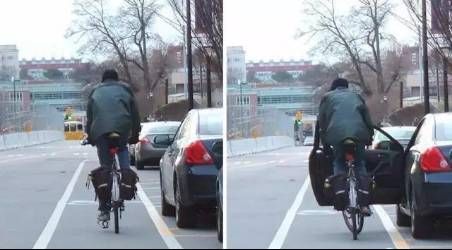當前位置: Language Tips> 流行新詞
因“開車門”不當而導致的事故,十分常見,而且一旦發生,就可能是慘劇。

The phenomenon of bikers getting hit by an opening car door is so common it has its own term: dooring.
騎車人被打開的汽車門撞到,這種情況很常見,英語里有個專門的詞來描述,那就是dooring。
According to a study in Chicago, as many as 1 in 5 bicycle accidents involve car doors – in total, there is an average of nearly one dooring per day in the Windy City.
根據芝加哥的一項調查,有多達五分之一的自行車事故和開車門有關。總體來看,在芝加哥平均每天都會發生一起因為開車門撞到騎車人的事故。
Even when bikers swerve to avoid doors, they can end up getting hit by cars.
即使騎車人趕緊轉彎想避開,也難免被撞到。
開車門引發的悲劇,我們該如何避免?
最近,一種“荷蘭式開車門”法,突然在網上火了。
什么是“荷蘭式開車門法”?這是一種荷蘭人發明的Dutch Reach。荷蘭人用“離車門最遠的手”去開車門,強迫自己扭動身體向后看。簡單來說就是:左邊用右手開,右邊用左手開。
當你使用離車門較遠的那只手開門時,上半身會自然而然地轉動,頭部和肩膀就會很自然地向外看。

The Dutch Reach is a practice where instead of using your near hand — usually the driver’s left hand — to open your car door, you use your far hand. Your right hand.
按照“荷蘭式開車門”法,開車門時不要用離車門近的那只手(通常是司機的左手),而要用離車門遠的手,一般是司機的右手。
In doing that, you automatically swivel your body. And you position your head and shoulders so you are looking directly out.
這樣做,你的身體就會自動轉向,頭和肩膀的位置也會移動,自然向外看。
First, past the rearview mirror. And then, you are very easily able to look back and see if there are oncoming bicycles or cars or whatever.
你的視線首先會掃過后視鏡,之后很容易就能向后看,發現后方是否有駛來的自行車、汽車或者別的什么。
The simplicity of the approach is part of its genius.
這個方法非常簡單,也正是其精妙之處。
多做一個動作,就能避免交通事故,你記住了嗎?
(中國日報網英語點津 yaning)
上一篇 : 特朗普患上“幽居病”
下一篇 : “小留學生”問題多
關注和訂閱

電話:8610-84883645
傳真:8610-84883500
Email: languagetips@chinadaily.com.cn